Advertisement
Partying To Classical Music, Dancing With The Stars (Like Stravinsky)
Resume
There’s nothing new about millennials having an uninhibited dance party. But it’s not every night that the music is Igor Stravinsky’s “Rite of Spring.” The occasion was a collaboration between Boston Philharmonic New Directions and Groupmuse, an organization trying to carry the torch of classical music to generations who haven't been particularly interested in the form. Or who have been turned off by the stuffy vibe.
Baby boomers may have been attracted to the joy of classical music by the anything-but-stuffy Leonard Bernstein’s “Young People’s Concerts” or by music education in public schools. As both television and schools have lost interest in the performing arts (the Metropolitan Opera and a smidgen of other things on public television notwithstanding) classical music has lost traction in the public imagination, particularly among younger people.
So Sam Bodkin decided to provide a gateway drug — parties in people’s living rooms with local performers providing Bach and Beethoven instead of Kanye and Katy. Bodkin, himself, became a born-again Beethovenian in college when he heard Beethoven’s “Grosse Fuge” in a friend’s apartment.

“I listened to the piece 10 times a day for the next two weeks,” says Bodkin, now 26. “And then I went to the Newton Free Library. I was indiscriminately yanking anything off the shelf I could find and within about six months I had a super-stacked iPod. I was listening to hours of classical music a day and I had basically decided I was going to devote my life to expanding the listenership of this art form which had suddenly ballooned my internal universe and had added such richness to my life on a daily basis.”
Today Groupmuse has weekly events in people’s living rooms in Boston (the first was in January 2013), New York, Seattle and San Francisco and “Massive Muses” like the “Rite of Spring” dance party (conducted by James Blachly, New Directions founder) at other venues.
At a recent Somerville Groupmuse, the audience seemed to be divided among classical devotees; people who didn’t know that much about the music but had heard that it was a fun social scene; and everyone in between. Most were in their 20s or 30s, but other parties attract older generations, depending on their descriptions on the Groupmuse website, where people sign up. Most in attendance were members of the professional class -- entrepreneurs, Web developers, teachers.

The nights begin with chatting and noshing -- red wine and Dunkin’ Donuts were the main course that night. The mixture of socializing and culture are becoming more and more important to arts organizations as millennials put more and more of a premium on mixing the two.
While Groupmuse has been leading the charge, they’re hardly the only ones trying to get classical music out of the concert hall. The American Repertory Theater’s Oberon has had several concerts, and even lectures with music, where cocktail shakers introduce intriguing programs like the Juventas New Music Ensemble entertaining collaboration with Puppet Showplace Theater last spring. The Celebrity Series mixes all kinds of music together in informal settings with their new Stave Sessions.
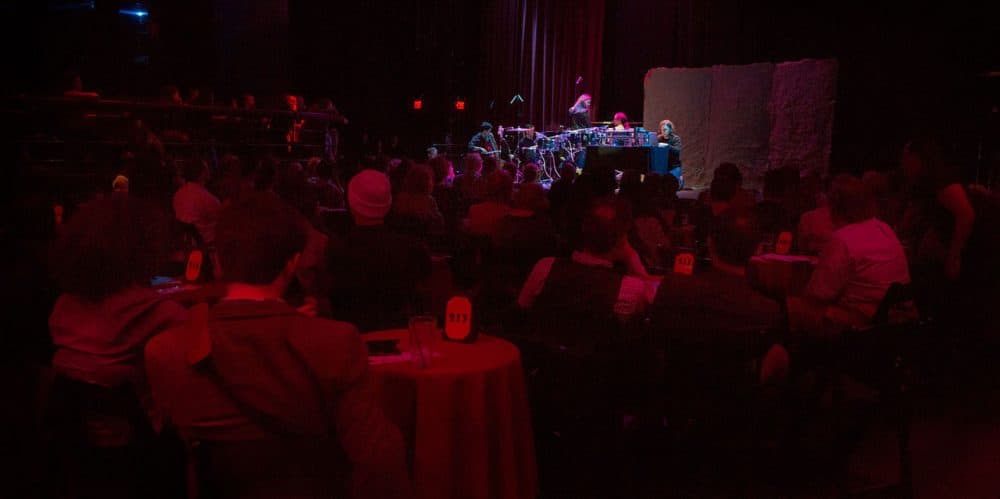
Sometimes those trying to sell the music try a little too hard, as when one violinist at a previous Groupmuse event explained to the crowd, “Bach was a real badass.”
This all has the air of desperation about it to jazz artist Vijay Iyer, whose compositions sometimes veer into classical terrain.
"I think what’s happening is concern from the classical music community because they’ve focused too long on the music of dead white men that only appeals to a dying generation,’’ Iyer said.
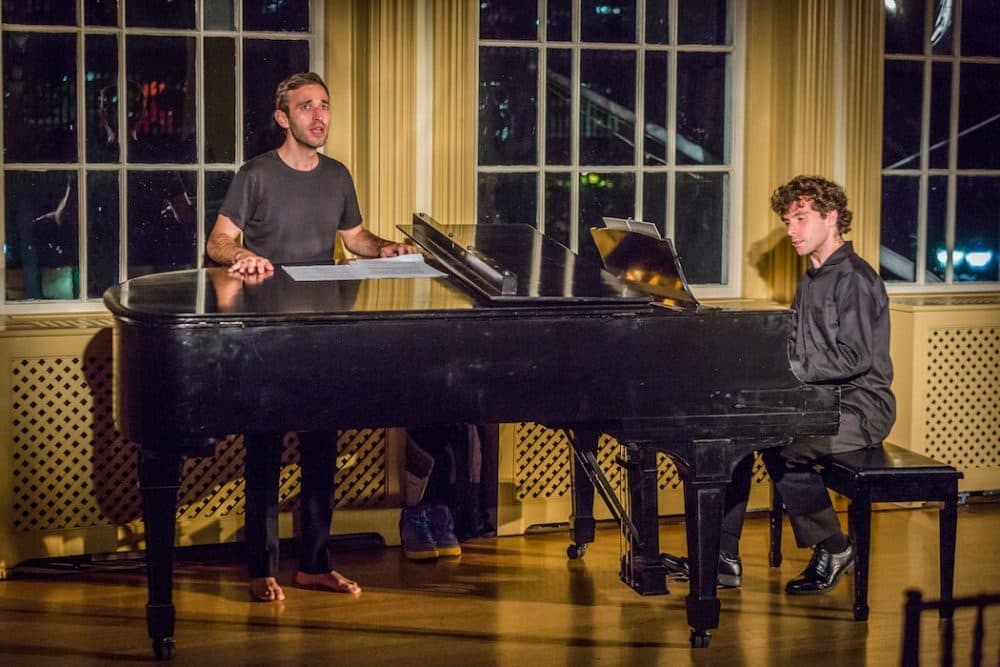
Well, maybe not only the dead and the dying. The Peabody Essex Museum had a ravishing chamber performance led by 25-year-old composer-in-residence Matthew Aucoin (the A.R.T.’s “Crossing”) and director Victoria Crutchfield that owed as much to the youthful immersiveness of the American Repertory Theater’s “Sleep No More” as it did to, say, the Emerson String Quartet at Jordan Hall.
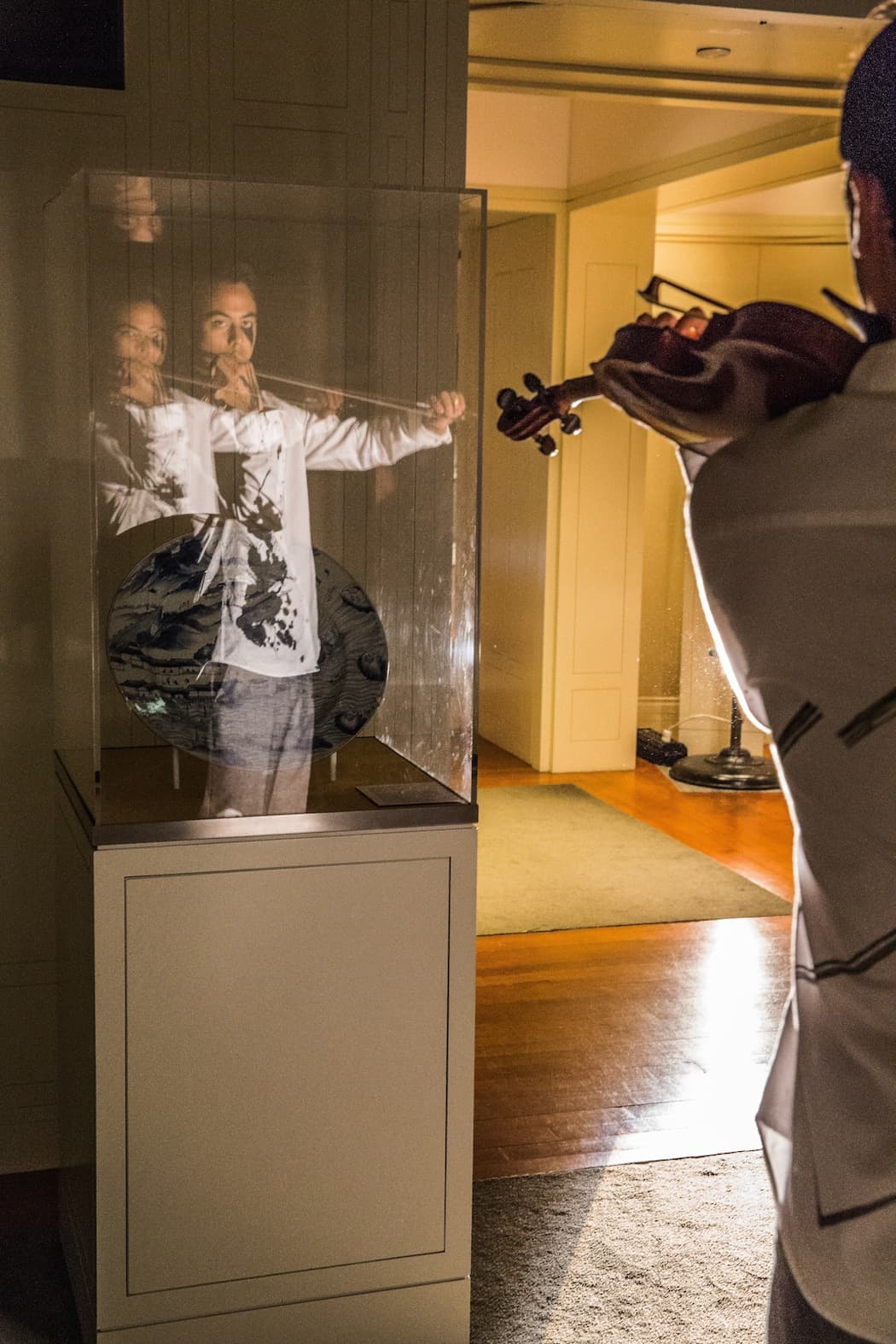
Audiences, separated into three groups, were led from one art-laced room to another listening to beautifully performed — in terms of both the acting and the singing — of songs by Debussy, Ravel and Berg, before all convening in the East India Marine Hall to hear Aucoin’s excellent Ligeti-like composition, "This Earth."
Aucoin -- who has conducted a Groupmuse event, not to mention the Chicago Symphony Orchestra -- says that the mixture of chamber music and social gatherings is nothing new.
“A lot of the greatest music was made to be performed in people’s living rooms and in intimate settings," Aucoin said. "It’s only because that tradition was imported by rich Americans who wanted to seem European that it has gotten this toxic reputation in this country.”
True enough, though Europeans have gotten into a rut themselves, which the august classical label, Deutsche Grammophon (DG), has been trying to counter. The German violinist Anne-Sophie Mutter doesn’t have much trouble selling out Symphony Hall or any other place she plays, but like many classical musicians has noticed that her audiences haven't been getting any younger.
So for her latest CD she went to a graffiti-laced club in Berlin called Neue Heimat (New Home) for a hot set of Vivaldi, Gershwin, Bach and friends. The energy with which Mutter and the crowd feed off each other is palpable.
In the liner notes she says, “It felt like I was in the lion’s den. But I definitely wanted to put the audience in touch with the music I love and believe in, music that packs such an emotional punch. An audience which, sad to say, I’ll never find in the Philharmonie. So I thought to myself: OK, if there’s a bunch of people who won’t go to the Philharmonie, I’ll have to go to them. I’ll ‘stalk’ them, so to speak, and go to their club.”
DG has also just released a one-hour CD and eight-hour download of Max Richter’s “Sleep,” which will be performed this month from midnight to 8 a.m., also in Berlin, and audiences will be given beds, rather than seats. It takes a pretty courageous composer, whose music is reminiscent of both minimalist composer John Adams and ambient rock producer Brian Eno, to say he wants his music to put people to sleep.
"It’s a piece of nighttime music and I’m hoping people will actually sleep through it. In a way it’s a question of how everything is getting faster," Richter said in a DG promotional film. "All our lives are accelerating. And I think many of us feel the need for a place to rest, a point of repose."
In addition to five CDs by Richter, a “post-classical” artist who wrote the haunting music for HBO’s “The Leftovers,” DG has released CDs by Richard Reed Parry (Arcade Fire), Jonny Greenwood (Radiohead) and Bryce Dessner (The National). Whether these stand the test of time or not, who knows. Other rock stars — Paul McCartney, Billy Joel, Elvis Costello — have tried their hands at classical composition, but the difference here is that these new guys have actual classical training. It’s not a case — sorry, Sir Paul — of every clown wanting to play Hamlet.
Still, it’s hard to imagine much of this music converting millennials to classical music. So let’s get back to donuts and Bartók at Groupmuse. Listening in on some of the conversations there it was as likely to be about whether roses or sunflowers make the better gift, but the appreciation of the music also seems genuine.
The host, James Burgess, said, “For me to go to the BSO is pretty tough. I’ve got to shell out a little money and dress up -- get downtown by 5 p.m. But to have people come over and relax — I’m not wearing any shoes right now — it’s just a lot more accessible and the music is awesome."
Of course, the money being saved comes at a cost. The musicians each got paid a little over $100 each for the Somerville event.
Said violist Amelia Hollander Ames, “This is really fun in terms of the musical experience I’ve had. You can have to kind of balance -- if I’m going to have an amazing experience and a fulfilling musical experience then I’ll do it for less. I will say as a model this is not sustainable for professional musicians. This is a lot less than what we normally make. At the same time … am I making that sitting in the back of a section playing the same thing I’ve played a thousand times before or am I playing music with artistic authority and integrity and autonomy? So hopefully this model will become more sustainable.”
Hopefully, indeed. Until then, let’s put on our dancing shoes, turn on Igor Stravinsky, and bust a few moves.
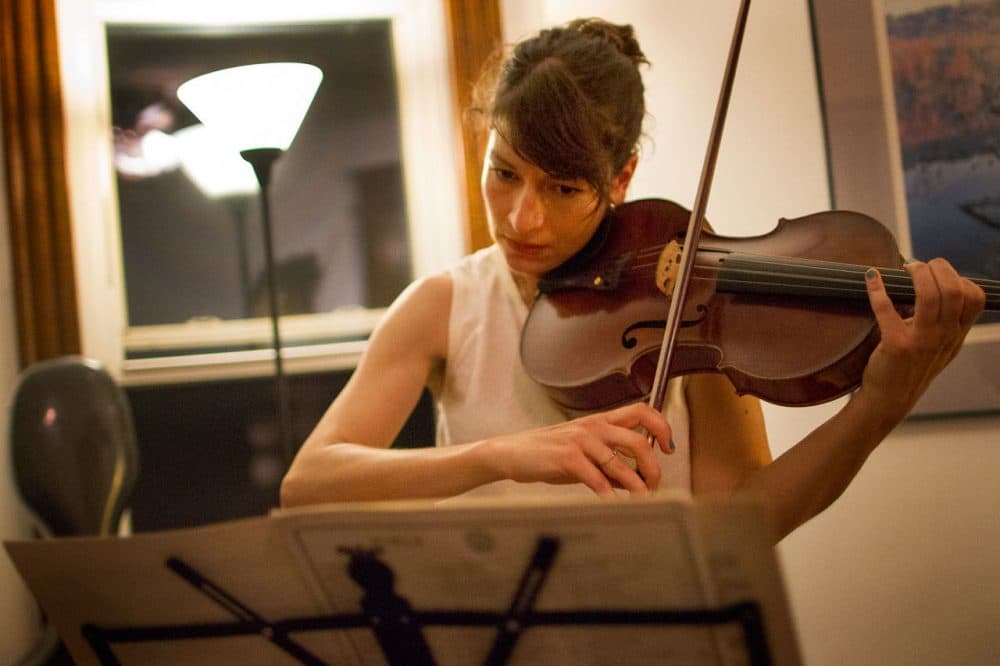
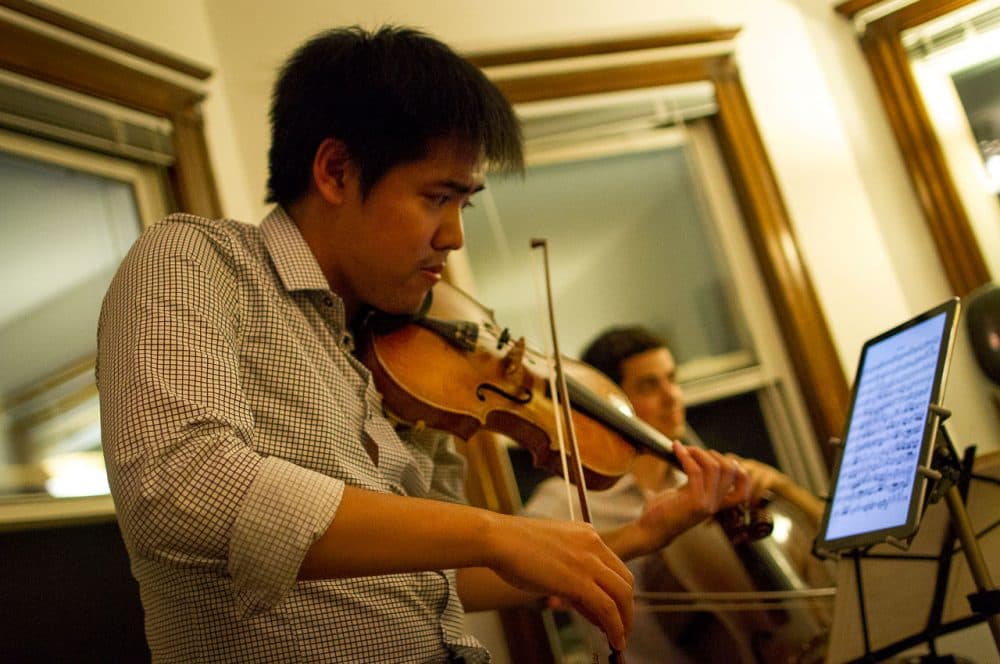
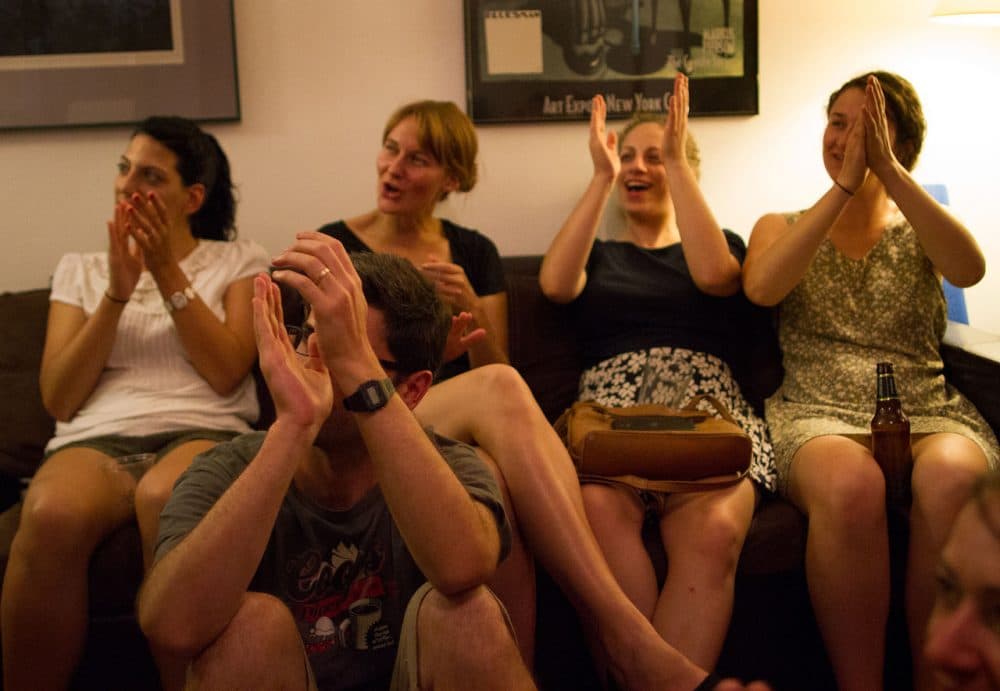
Rebecca Sananes contributed to this report.
Check out some classical music suggestions from The ARTery's Ed Siegel, Keith Powers, Lloyd Schwartz and Kilian Melloy:



